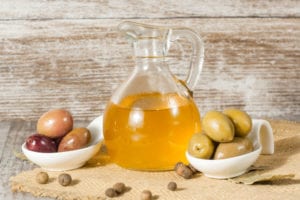Written by Jessica Patella, ND. This large study of U.S. men and women showed that a higher intake of olive oil was associated with significantly lower risk of cardiovascular disease and coronary artery disease.
 Cardiovascular disease is the leading cause of death in the United States and worldwide 1,2. Yet, it can be largely prevented with a healthy lifestyle 1,2. A diet higher in unsaturated fatty acids and lower in saturated fatty acids is recommend for reducing the risk of cardiovascular disease 1,3. Olive oil is an example of a fat that is high in unsaturated fat and it is a major part of the Mediterranean diet, but little was known about the benefits of olive oil in the U.S. 1. This was the first study to examine effects of olive oil in the diet on cardiovascular disease risk in the U.S. population 1.
Cardiovascular disease is the leading cause of death in the United States and worldwide 1,2. Yet, it can be largely prevented with a healthy lifestyle 1,2. A diet higher in unsaturated fatty acids and lower in saturated fatty acids is recommend for reducing the risk of cardiovascular disease 1,3. Olive oil is an example of a fat that is high in unsaturated fat and it is a major part of the Mediterranean diet, but little was known about the benefits of olive oil in the U.S. 1. This was the first study to examine effects of olive oil in the diet on cardiovascular disease risk in the U.S. population 1.
The researcher included two large cohort studies. A total of 61,181 women from the Nurses’ Health Study (NHS 1990-2014) and 31,797 men from the Health Professionals Follow-up Study (HPFS 1990-2014) who were free of cancer, heart disease and stroke at baseline were included in the study. Diet was assessed using a 130-item food frequency questionnaires at baseline and then every four years.
The primary outcome measure was a major cardiovascular event, including nonfatal heart attack, nonfatal stroke or fatal cardiovascular event (stroke, heart attack or other). Heart attacks were confirmed through electrocardiogram changes or elevated cardiac enzymes. Strokes were confirmed via the National Survey of Stroke criteria requiring a neurological deficit with sudden or rapid onset for more than 24 hours 1.
Olive oil intake was calculated from three parts of the questionnaire, olive oil salad dressing, olive oil added to food or bread and olive oil used from baking and frying at home. Intake was then broken down into the following intake amounts:
- Never or less than once per month
- Up to 1 teaspoon a day (0-4.5 g)
- 1 teaspoon to less than 0.5 tablespoon a day (4.5-7 g)
- More than 0.5 tablespoon a day (more than 7 g)
The results showed during the average 24 years of follow-up, a total of 9,797 cardiovascular disease events were documented (5,487 in NHS and 4,310 in HPFS). Average consumption of olive oil increased from 1.30 g/day in 1990 to 4.2 g/day in 2010, while consumption of margarine decreased. Participants with a higher intake of olive oil also tended to have a higher intake of nuts, fruits, vegetables and other plant oils. The average intake of total olive oil in the highest category (more than 0.5 TBS) was 12 g/day.
Comparing those who consumed the least amount of olive oil to those that consumed the most, those who consumed the most had a 14% lower risk of cardiovascular disease (HR 0.86; 95%CI: 0.79-0.94; p<0.001) and 18% lower risk of coronary heart disease (HR 0.82; 95%CI: 0.73-0.91). Total olive oil intake as also associated with a lower risk of fatal cardiovascular disease and each 5 g/day increase in olive oil consumption was associated with an 8% lower risk of fatal events (95% CI:0.87-0.97; p=0.01) and a 4% lower risk of nonfatal events (95% CI: 0.92-0.99; p=0.02). Researchers estimated replacing 5 g/day of margarine with 5 g/day of olive oil was associated with a 6% lower risk of cardiovascular disease (95%CI: 0.91-0.97; p<0.001) 1.
This large study of U.S. men and women showed that a higher intake of olive oil was associated with significantly lower risk of cardiovascular disease and coronary artery disease. Researchers suggest replacing margarine, butter, mayonnaise, and dairy fat with olive oil to decrease cardiovascular events 1. This was the first study to evaluate whether a higher intake of olive oil can prevent cardiovascular disease in the U.S. population 1.
Guasch-Ferré, Marta, Gang Liu, Yanping Li, Laura Sampson, JoAnn E. Manson, Jordi Salas-Salvadó, Miguel A. Martínez-González et al. “Olive oil consumption and cardiovascular risk in US adults.” Journal of the American College of Cardiology 75, no. 15 (2020): 1729-1739.
© 2020 BY THE AMERICAN COLLEGE OF CARDIOLOGY FOUNDATION PUBLISHED BY ELSEVIER
Click here to read the full text study.
Posted July 13, 2021.
References:
- Guasch-Ferré M, Liu G, Li Y, et al. Olive Oil Consumption and Cardiovascular Risk in U.S. Adults. J Am Coll Cardiol. 2020;75(15):1729-1739.
- Mente A, de Koning L, Shannon HS, Anand SS. A systematic review of the evidence supporting a causal link between dietary factors and coronary heart disease. Archives of internal medicine. 2009;169(7):659-669.
- U.S. Department of Agriculture and U.S. Department of Health and Human Services. Scientific report of the 2015 Dietary Guidelines Advisory Committee: advisory report to the Secretary of Health and Human Services and the Secretary of Agriculture. 2015.

